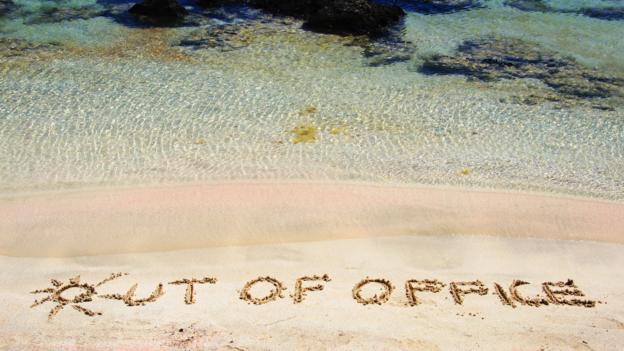
(Thinkstock)
In 2007, Jeremy Askew left the UK practice where he was an
independent financial advisor and set out to see the world.
During his 22-month sabbatical, he watched England play cricket in Sri Lanka, visited the part of India where his grandmother grew up and biked around London visiting various museums.
In
the US, fewer than two in 10 employers offer sabbatical leave, and for
two-thirds of those companies, it’s unpaid time off, according to US
human resources company World At Work. In the UK, some 41% of employers
offer the ability to take a sabbatical, but only 2% of employees take
them up on the offer, according to UK human resources organization CIPD.
In Japan, only 14% of companies provide personal maintenance leave, and
only 8.5% provide volunteer leave, according to the Japanese Institute
for Labour Policy and Training.During his 22-month sabbatical, he watched England play cricket in Sri Lanka, visited the part of India where his grandmother grew up and biked around London visiting various museums.
If you can make it work for you, however, experts agree that it can be a life-changing experience. Here’s how to take the leap:
Five Years to Go
Decide what you’d like to do, and what you hope to get out of it.
“Are you looking for down time? Personal development? Or improving your CV?,” asked Will Jones, marketing manager for i-to-i Volunteering in the UK.
You can boost your resume on a break in a variety of ways — by taking a class, interning for an overseas company, or volunteering. After all, managing people, working as part of a team, teaching, and organizing are all skills that are highly transferrable.
But don’t underestimate the benefits of travel for exploration’s sake, either. “Personal development is a by-product of traveling anyway,” Jones said. “The nature of having to budget, plan, scrimp, save—it’s often quite an extreme removal from your comfort zone.”
Set a time goal. How long will you be gone? How long can you be gone? If your company offers a sabbatical program you may have to work within the confines of what it provides.
And, you must consider your own limits. “A lot of my clients are in health- or technology-related professions, so they can take six months to a year off,” said Brian Frederick, a financial planner with Stillwater Financial Partners in Arizona in the US. “But if they take off longer than that, they run the risk that their skills start to atrophy.”

“We spent about 30% more than I had planned on,” said Diane Byrne, a financial planner in Wisconsin who took three extended trips in 2002 to tour the US with her husband in a motorhome. “It was the experience of a lifetime so we weren’t going to scrimp on things.”
Once you have a number, divide it by 60 months (five years) and start the five-year clock. Each month, put away 1/60th of your total number. Repeat.
Checklist: Five Years Before
- Decide what you want to do
- Think about how long you’d like to be gone
- Create a budget
Begin this way of life: save first and spend second.
That means sending money to your savings account the moment you get paid. Have it transferred automatically each payday. You might consider taking on a seasonal job or freelance work for extra income to boost your sabbatical savings. Katie Erickson, a US financial planner who is taking a sabbatical in Jakarta, Indonesia, suggests taking that empty extra room and “renting out on AirBnB,” a site available in 192 countries that allows you to let a room in your home to guests, for bonus cash.
It’s also important to tackle debt before you go.
“You better not be carrying consumer debt that’s going to be enslaving your ability to be free and open,” said Mike Haubrich, a financial planner with Financial Service Group in Wisconsin. Make a plan to clear any credits cards while you still have a pay cheque.
Checklist: Four Years Before
- Save, save, save
- Pay down debt
- Consider ways to earn extra cash
So what are you actually going to do when you’re gone? If you have your heart set on a formal volunteer program in a particular country, start early to secure your spot. Or, if you're planning to attend a particular event like the Olympics or the FIFA World Cup that occurs every four years, now is the time to start researching.
Benefits are another concern to consider far in advance. What are you going to do for health insurance while you’re away? Can you get it through a spouse? Purchase a policy while you travel? If your health insurance won’t cover you in another country, consider a supplemental plan that will — the last thing you need is to be without insurance in a foreign country and get seriously ill.

If you’re taking a sabbatical to do volunteer work, it never hurts to canvas local businesses to see if any of them would be interested in supporting you in your endeavour. In the UK, for instance, many large organizations have a corporate social responsibility budget.
“Send a letter out to local businesses and ask if they have any CSR budget” to help with your trip, said Jones. “Even if you get nothing from it, what you have is a story you can share [with future employers] about the money acumen you picked up through fundraising.”
If your company has a formal sabbatical program and other employees have done it before, talk to them about it.
“Find out what worked really well for them, and find out what their regrets are so you can learn from their experience,” Haubrich said. If you don’t have any colleagues who have taken the plunge, reach out to other contacts who have done it. If you have to change course based on someone’s recommendations, it’s far better to know it now.
Now is also the time to tell your employer your plans. The more notice they have, and the more you're able to sell the time away to them as beneficial, the better the results are likely to be.
Checklist: Two to Three Years Before
- Find a volunteer program or must-see events and make arrangements
- Fundraise with local businesses
- Talk to people who have done it before
- Tell your employer about your plans
The last year is all about details. For instance, do you need any inoculations before you travel to a foreign country? If you’re traveling to Indonesia, for instance, you should make sure you’ve had vaccines for Hepatitis A and Typhoid, among other things.
Do you need a visa? Visit the embassy website of the country you hope to visit to find out exactly what you need and when you should apply for it. You may have to send in your passport to acquire one, so plan accordingly.
Don’t forget about the day-to-day minutia. For instance, what will happen to your mail while you are away? Will you be paying your bills remotely? And if no one is staying in your house while you’re away, do you have someone checking on it?
“Many home insurance policies require that your residence not be left vacant for any length of time, so check your policy terms,” said Cynthia Kett, a financial advisor with Stewart & Kett Financial Advisors in Toronto, Canada. If you plan to rent to a stranger, take prudent precautions, such as requesting a damage deposit and checking references
“One time we were gone for five months and we had a college student live in our house,” Byrne said. “He didn’t pay us rent but we didn’t have to pay a house sitter. He took care of snow removal and all the maintenance type things. It was a win-win.”
If you have to put any of your things in storage, take this opportunity to purge what you don’t need. “This is a perfect opportunity to pare down your personal belongings,” said Katie Erickson. “Have a garage sale. Sell on Amazon Marketplace and Craigslist. Paying for storage for things you never use is abysmal financial planning.”
Last, give yourself time to adjust once you’ve started your adventure. When Erickson left the US 11 months ago for Indonesia, she was nervous that she’d hate Jakarta and she worried about financial security.
“There were a lot of gut checks and questioning of the decision to shake up everything about my life,” Erickson said. “At this point, I feel that moving to Jakarta was one of the best major decisions I’ve ever made.”
Checklist: One Year Before
- Get inoculations, apply for visa
- Take care of day-to-day details
- Store and sell your stuff





